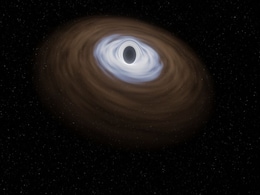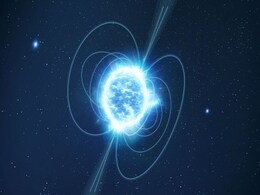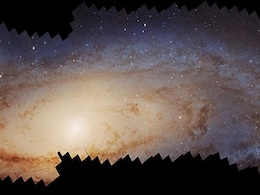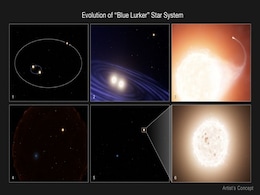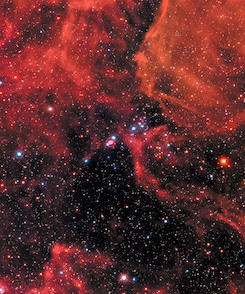Nasa Hubble Telescope
- All
- News
- Web Stories
-

Neighbouring Planets To Faraway Galaxies, NASA Shares Stunning Pics To Celebrate Hubble Telescope's 35th Anniversary
- Thursday April 24, 2025
- Science | Edited by Bhavya Sukheja
To mark the 35th anniversary of the Hubble Space Telescope, the US space agency NASA released new high-definition photos taken with the technological marvel.
-
 www.ndtv.com
www.ndtv.com
-

NASA Hubble Space Telescope Helps Confirm the First Solitary Black Hole
- Friday April 18, 2025
- Written by Gadgets 360 Staff
In the Sagittarius constellation, a lone and first-ever solitary black hole has been discovered by a team of scientists. Although the discovery began in the year 2011, the observations have confirmed it recently. The size of this black hole is as massive as seven times of the sun. Despite the conflicts and differences of observations by another tea...
-
 www.gadgets360.com
www.gadgets360.com
-

NASA’s Hubble Space Telescope Shares Detailed Mosaic of the Sombrero Galaxy
- Friday April 18, 2025
- Written by Gadgets 360 Staff
NASA’s Hubble reveals a detailed view of the Galactic favourite, the Sombrero Galaxy, telling about the rare shape of the galaxy. The Sombrero Galaxy is found to have metal-rich stars in its outer region. This research has a future scope of getting deeper insights into its formation by using the advanced imaging technique of Hubble.
-
 www.gadgets360.com
www.gadgets360.com
-

NASA’s Hubble Space Telescope Tracks a Neutron Star With Mysterious Origin
- Wednesday April 16, 2025
- Written by Gadgets 360 Staff
NASA’s Hubble Space Telescope spotted a rogue magnetar, dubbed SGR 0501+4516, traversing our galaxy for a significantly long time. As per claims by scientists, it was first discovered in the year 2008 by NASA's Swift Observatory as intense flashes of gamma rays in the outer area of the Milky Way
-
 www.gadgets360.com
www.gadgets360.com
-

Hubble Telescope Captures NGC 4536, a Starburst Galaxy with Intense Star Formation
- Wednesday March 26, 2025
- Written by Gadgets 360 Staff
NASA’s Hubble Space Telescope has captured a striking image of NGC 4536, a starburst galaxy 50 million light-years away in the Virgo constellation. The galaxy’s sweeping spiral arms are filled with young blue star clusters and ionized hydrogen gas, indicating rapid star formation. Astronomers believe its bar-like structure channels gas toward t...
-
 www.gadgets360.com
www.gadgets360.com
-

Hubble Captures Stunning Tarantula Nebula Image, Revealing Cosmic Dust and Star Formation
- Thursday February 27, 2025
- Written by Gadgets 360 Staff
A new image from the Hubble Space Telescope highlights the Tarantula Nebula’s complex structure, featuring dense cosmic dust clouds and vibrant star-forming regions. This nebula, located 160,000 light-years away, plays a vital role in understanding stellar evolution. The captured details offer insights into how cosmic dust contributes to star and...
-
 www.gadgets360.com
www.gadgets360.com
-

Hubble’s New Image of Tarantula Nebula Showcases Cosmic Dust and Star Formation
- Tuesday February 18, 2025
- Written by Gadgets 360 Staff
NASA/ESA’s Hubble Space Telescope has captured a breathtaking image of the Tarantula Nebula, located 160,000 light-years away in the Large Magellanic Cloud. The image reveals intricate cosmic dust patterns and active star formation, offering valuable insights into the role of interstellar material in stellar evolution. Researchers are using the d...
-
 www.gadgets360.com
www.gadgets360.com
-

Hubble Spots Distant Supernova in Gemini, Enhancing Cosmic Distance Studies
- Tuesday February 4, 2025
- Written by Gadgets 360 Staff
The NASA/ESA Hubble Space Telescope has captured a stunning image of SN 2022aajn, a Type Ia supernova in the constellation Gemini. Located 600 million light-years away, the explosion was first detected in November 2022. Type Ia supernovae serve as essential cosmic distance markers due to their predictable brightness. Hubble’s observations, part o...
-
 www.gadgets360.com
www.gadgets360.com
-

Hubble’s Detailed Andromeda Galaxy Mosaic Sheds Light on Its Past and Evolution
- Tuesday January 21, 2025
- Written by Gadgets 360 Staff
NASA’s Hubble Space Telescope has produced a massive photomosaic of the Andromeda galaxy, revealing more than 200 million stars. The study offers fresh insights into Andromeda’s evolutionary history, which includes mergers with smaller galaxies. This breakthrough provides a clearer picture of the galaxy's structure and the processes that shaped...
-
 www.gadgets360.com
www.gadgets360.com
-

Webb Telescope Tracks Formation and Expansion of Carbon-Rich Dust Shells in Star System
- Thursday January 16, 2025
- Written by Gadgets 360 Staff
As per the latest report by NASA, the system consists of two stars in an elongated orbit. When these stars come closest, their stellar winds collide, compressing material and forming carbon-rich dust. As reported in an official press release by NASA, Emma Lieb, a doctoral student at the University of Denver and the study's lead author, noted that t...
-
 www.gadgets360.com
www.gadgets360.com
-

NASA’s Hubble Observes Rare Blue Lurker Star with Unusual Evolution in M67 Cluster
- Friday January 17, 2025
- Written by Gadgets 360 Staff
NASA’s Hubble Space Telescope has identified a rare stellar phenomenon called the “blue lurker” in the M67 star cluster. Located 2,800 light-years away, this star is part of a triple-star system and has an unusual evolutionary history. The blue lurker’s accelerated spin, taking just four days, contrasts with the typical rotation of Sun-like...
-
 www.gadgets360.com
www.gadgets360.com
-

Stunning Space Imagery Captured By NASA's Hubble Space Telescope
- Tuesday December 31, 2024
- Science | Edited by Nikhil Pandey
From the star-forming Carina Nebula, located 7,600 light-years away, to the dramatic bipolar region Sharpless 2-106, Hubble reveals the dynamic processes of star creation and destruction.
-
 www.ndtv.com
www.ndtv.com
-

NASA's Hubble and Chandra Telescopes Spot Strange Tilted Black Hole
- Tuesday December 24, 2024
- Written by Gadgets 360 Staff
NASA’s Hubble and Chandra telescopes have uncovered a bizarre sideways black hole in the galaxy NGC 5084, located 80 million light-years away. The black hole’s unexpected tilt suggests it may have been influenced by a violent galactic collision. A new image processing technique, SAUNAS, revealed X-ray plumes in the galaxy, hinting at a cosmic e...
-
 www.gadgets360.com
www.gadgets360.com
-

Hubble and Chandra Telescopes Spot Strange Tilted Black Hole in Galaxy NGC 5084
- Tuesday December 24, 2024
- Written by Gadgets 360 Staff
NASA’s Hubble and Chandra telescopes have uncovered a bizarre sideways black hole in the galaxy NGC 5084, located 80 million light-years away. The black hole’s unexpected tilt suggests it may have been influenced by a violent galactic collision. A new image processing technique, SAUNAS, revealed X-ray plumes in the galaxy, hinting at a cosmic e...
-
 www.gadgets360.com
www.gadgets360.com
-

NASA Finds Black Hole Rotating at Unexpected Angle in NGC 5084 Galaxy
- Friday December 20, 2024
- Written by Gadgets 360 Staff
NASA researchers have uncovered a black hole in the NGC 5084 galaxy that rotates at an unexpected angle, revealed through re-analysed Chandra X-ray data. The black hole is surrounded by unusual X-shaped plasma plumes, indicating disruptions in the galaxy's past. A tipped dusty disk further supports this, confirming the black hole's unique sideways ...
-
 www.gadgets360.com
www.gadgets360.com
-

Neighbouring Planets To Faraway Galaxies, NASA Shares Stunning Pics To Celebrate Hubble Telescope's 35th Anniversary
- Thursday April 24, 2025
- Science | Edited by Bhavya Sukheja
To mark the 35th anniversary of the Hubble Space Telescope, the US space agency NASA released new high-definition photos taken with the technological marvel.
-
 www.ndtv.com
www.ndtv.com
-

NASA Hubble Space Telescope Helps Confirm the First Solitary Black Hole
- Friday April 18, 2025
- Written by Gadgets 360 Staff
In the Sagittarius constellation, a lone and first-ever solitary black hole has been discovered by a team of scientists. Although the discovery began in the year 2011, the observations have confirmed it recently. The size of this black hole is as massive as seven times of the sun. Despite the conflicts and differences of observations by another tea...
-
 www.gadgets360.com
www.gadgets360.com
-

NASA’s Hubble Space Telescope Shares Detailed Mosaic of the Sombrero Galaxy
- Friday April 18, 2025
- Written by Gadgets 360 Staff
NASA’s Hubble reveals a detailed view of the Galactic favourite, the Sombrero Galaxy, telling about the rare shape of the galaxy. The Sombrero Galaxy is found to have metal-rich stars in its outer region. This research has a future scope of getting deeper insights into its formation by using the advanced imaging technique of Hubble.
-
 www.gadgets360.com
www.gadgets360.com
-

NASA’s Hubble Space Telescope Tracks a Neutron Star With Mysterious Origin
- Wednesday April 16, 2025
- Written by Gadgets 360 Staff
NASA’s Hubble Space Telescope spotted a rogue magnetar, dubbed SGR 0501+4516, traversing our galaxy for a significantly long time. As per claims by scientists, it was first discovered in the year 2008 by NASA's Swift Observatory as intense flashes of gamma rays in the outer area of the Milky Way
-
 www.gadgets360.com
www.gadgets360.com
-

Hubble Telescope Captures NGC 4536, a Starburst Galaxy with Intense Star Formation
- Wednesday March 26, 2025
- Written by Gadgets 360 Staff
NASA’s Hubble Space Telescope has captured a striking image of NGC 4536, a starburst galaxy 50 million light-years away in the Virgo constellation. The galaxy’s sweeping spiral arms are filled with young blue star clusters and ionized hydrogen gas, indicating rapid star formation. Astronomers believe its bar-like structure channels gas toward t...
-
 www.gadgets360.com
www.gadgets360.com
-

Hubble Captures Stunning Tarantula Nebula Image, Revealing Cosmic Dust and Star Formation
- Thursday February 27, 2025
- Written by Gadgets 360 Staff
A new image from the Hubble Space Telescope highlights the Tarantula Nebula’s complex structure, featuring dense cosmic dust clouds and vibrant star-forming regions. This nebula, located 160,000 light-years away, plays a vital role in understanding stellar evolution. The captured details offer insights into how cosmic dust contributes to star and...
-
 www.gadgets360.com
www.gadgets360.com
-

Hubble’s New Image of Tarantula Nebula Showcases Cosmic Dust and Star Formation
- Tuesday February 18, 2025
- Written by Gadgets 360 Staff
NASA/ESA’s Hubble Space Telescope has captured a breathtaking image of the Tarantula Nebula, located 160,000 light-years away in the Large Magellanic Cloud. The image reveals intricate cosmic dust patterns and active star formation, offering valuable insights into the role of interstellar material in stellar evolution. Researchers are using the d...
-
 www.gadgets360.com
www.gadgets360.com
-

Hubble Spots Distant Supernova in Gemini, Enhancing Cosmic Distance Studies
- Tuesday February 4, 2025
- Written by Gadgets 360 Staff
The NASA/ESA Hubble Space Telescope has captured a stunning image of SN 2022aajn, a Type Ia supernova in the constellation Gemini. Located 600 million light-years away, the explosion was first detected in November 2022. Type Ia supernovae serve as essential cosmic distance markers due to their predictable brightness. Hubble’s observations, part o...
-
 www.gadgets360.com
www.gadgets360.com
-

Hubble’s Detailed Andromeda Galaxy Mosaic Sheds Light on Its Past and Evolution
- Tuesday January 21, 2025
- Written by Gadgets 360 Staff
NASA’s Hubble Space Telescope has produced a massive photomosaic of the Andromeda galaxy, revealing more than 200 million stars. The study offers fresh insights into Andromeda’s evolutionary history, which includes mergers with smaller galaxies. This breakthrough provides a clearer picture of the galaxy's structure and the processes that shaped...
-
 www.gadgets360.com
www.gadgets360.com
-

Webb Telescope Tracks Formation and Expansion of Carbon-Rich Dust Shells in Star System
- Thursday January 16, 2025
- Written by Gadgets 360 Staff
As per the latest report by NASA, the system consists of two stars in an elongated orbit. When these stars come closest, their stellar winds collide, compressing material and forming carbon-rich dust. As reported in an official press release by NASA, Emma Lieb, a doctoral student at the University of Denver and the study's lead author, noted that t...
-
 www.gadgets360.com
www.gadgets360.com
-

NASA’s Hubble Observes Rare Blue Lurker Star with Unusual Evolution in M67 Cluster
- Friday January 17, 2025
- Written by Gadgets 360 Staff
NASA’s Hubble Space Telescope has identified a rare stellar phenomenon called the “blue lurker” in the M67 star cluster. Located 2,800 light-years away, this star is part of a triple-star system and has an unusual evolutionary history. The blue lurker’s accelerated spin, taking just four days, contrasts with the typical rotation of Sun-like...
-
 www.gadgets360.com
www.gadgets360.com
-

Stunning Space Imagery Captured By NASA's Hubble Space Telescope
- Tuesday December 31, 2024
- Science | Edited by Nikhil Pandey
From the star-forming Carina Nebula, located 7,600 light-years away, to the dramatic bipolar region Sharpless 2-106, Hubble reveals the dynamic processes of star creation and destruction.
-
 www.ndtv.com
www.ndtv.com
-

NASA's Hubble and Chandra Telescopes Spot Strange Tilted Black Hole
- Tuesday December 24, 2024
- Written by Gadgets 360 Staff
NASA’s Hubble and Chandra telescopes have uncovered a bizarre sideways black hole in the galaxy NGC 5084, located 80 million light-years away. The black hole’s unexpected tilt suggests it may have been influenced by a violent galactic collision. A new image processing technique, SAUNAS, revealed X-ray plumes in the galaxy, hinting at a cosmic e...
-
 www.gadgets360.com
www.gadgets360.com
-

Hubble and Chandra Telescopes Spot Strange Tilted Black Hole in Galaxy NGC 5084
- Tuesday December 24, 2024
- Written by Gadgets 360 Staff
NASA’s Hubble and Chandra telescopes have uncovered a bizarre sideways black hole in the galaxy NGC 5084, located 80 million light-years away. The black hole’s unexpected tilt suggests it may have been influenced by a violent galactic collision. A new image processing technique, SAUNAS, revealed X-ray plumes in the galaxy, hinting at a cosmic e...
-
 www.gadgets360.com
www.gadgets360.com
-

NASA Finds Black Hole Rotating at Unexpected Angle in NGC 5084 Galaxy
- Friday December 20, 2024
- Written by Gadgets 360 Staff
NASA researchers have uncovered a black hole in the NGC 5084 galaxy that rotates at an unexpected angle, revealed through re-analysed Chandra X-ray data. The black hole is surrounded by unusual X-shaped plasma plumes, indicating disruptions in the galaxy's past. A tipped dusty disk further supports this, confirming the black hole's unique sideways ...
-
 www.gadgets360.com
www.gadgets360.com


